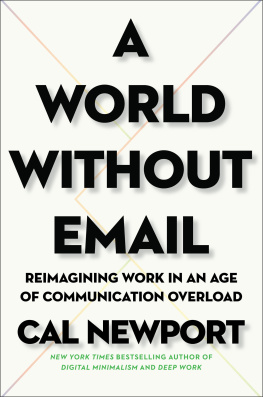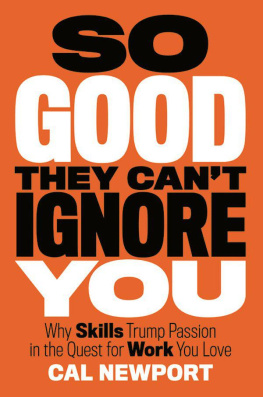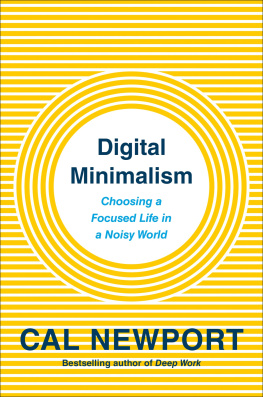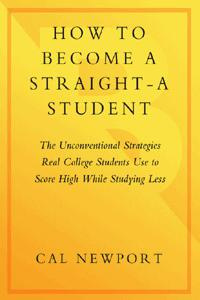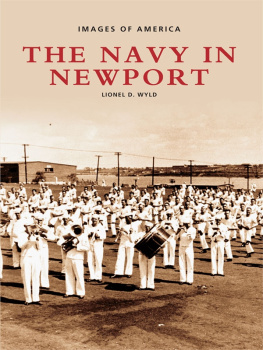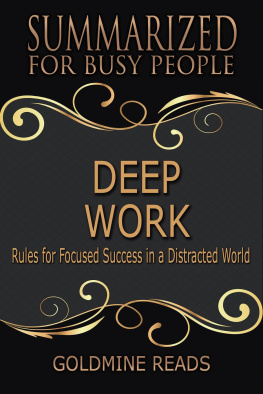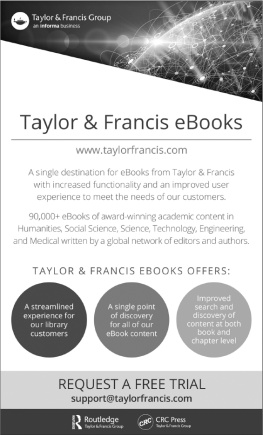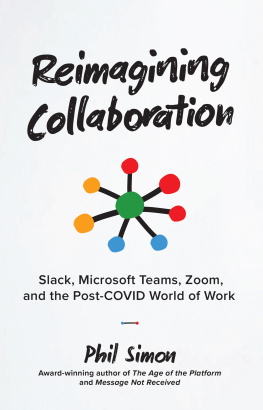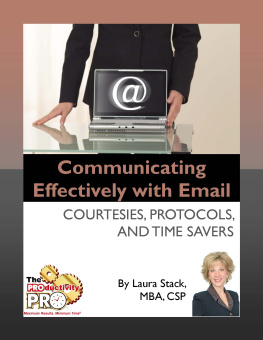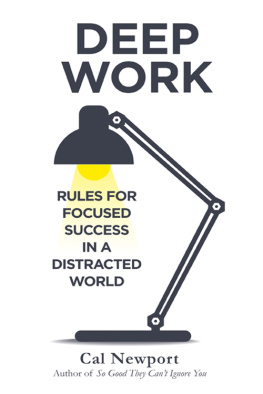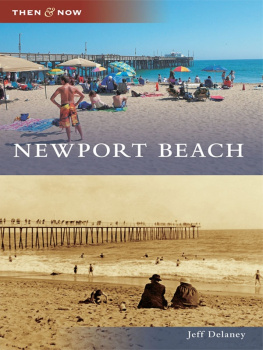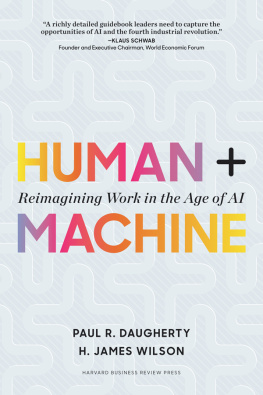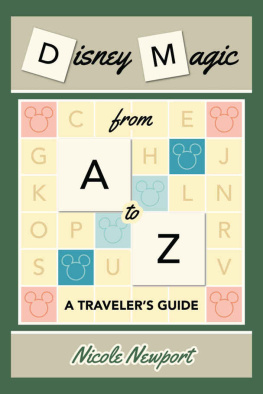Cal Newport - A World Without Email: Reimagining Work in an Age of Communication Overload
Here you can read online Cal Newport - A World Without Email: Reimagining Work in an Age of Communication Overload full text of the book (entire story) in english for free. Download pdf and epub, get meaning, cover and reviews about this ebook. year: 2021, publisher: Penguin Publishing Group, genre: Romance novel. Description of the work, (preface) as well as reviews are available. Best literature library LitArk.com created for fans of good reading and offers a wide selection of genres:
Romance novel
Science fiction
Adventure
Detective
Science
History
Home and family
Prose
Art
Politics
Computer
Non-fiction
Religion
Business
Children
Humor
Choose a favorite category and find really read worthwhile books. Enjoy immersion in the world of imagination, feel the emotions of the characters or learn something new for yourself, make an fascinating discovery.
- Book:A World Without Email: Reimagining Work in an Age of Communication Overload
- Author:
- Publisher:Penguin Publishing Group
- Genre:
- Year:2021
- Rating:5 / 5
- Favourites:Add to favourites
- Your mark:
- 100
- 1
- 2
- 3
- 4
- 5
A World Without Email: Reimagining Work in an Age of Communication Overload: summary, description and annotation
We offer to read an annotation, description, summary or preface (depends on what the author of the book "A World Without Email: Reimagining Work in an Age of Communication Overload" wrote himself). If you haven't found the necessary information about the book — write in the comments, we will try to find it.
A World Without Email: Reimagining Work in an Age of Communication Overload — read online for free the complete book (whole text) full work
Below is the text of the book, divided by pages. System saving the place of the last page read, allows you to conveniently read the book "A World Without Email: Reimagining Work in an Age of Communication Overload" online for free, without having to search again every time where you left off. Put a bookmark, and you can go to the page where you finished reading at any time.
Font size:
Interval:
Bookmark:
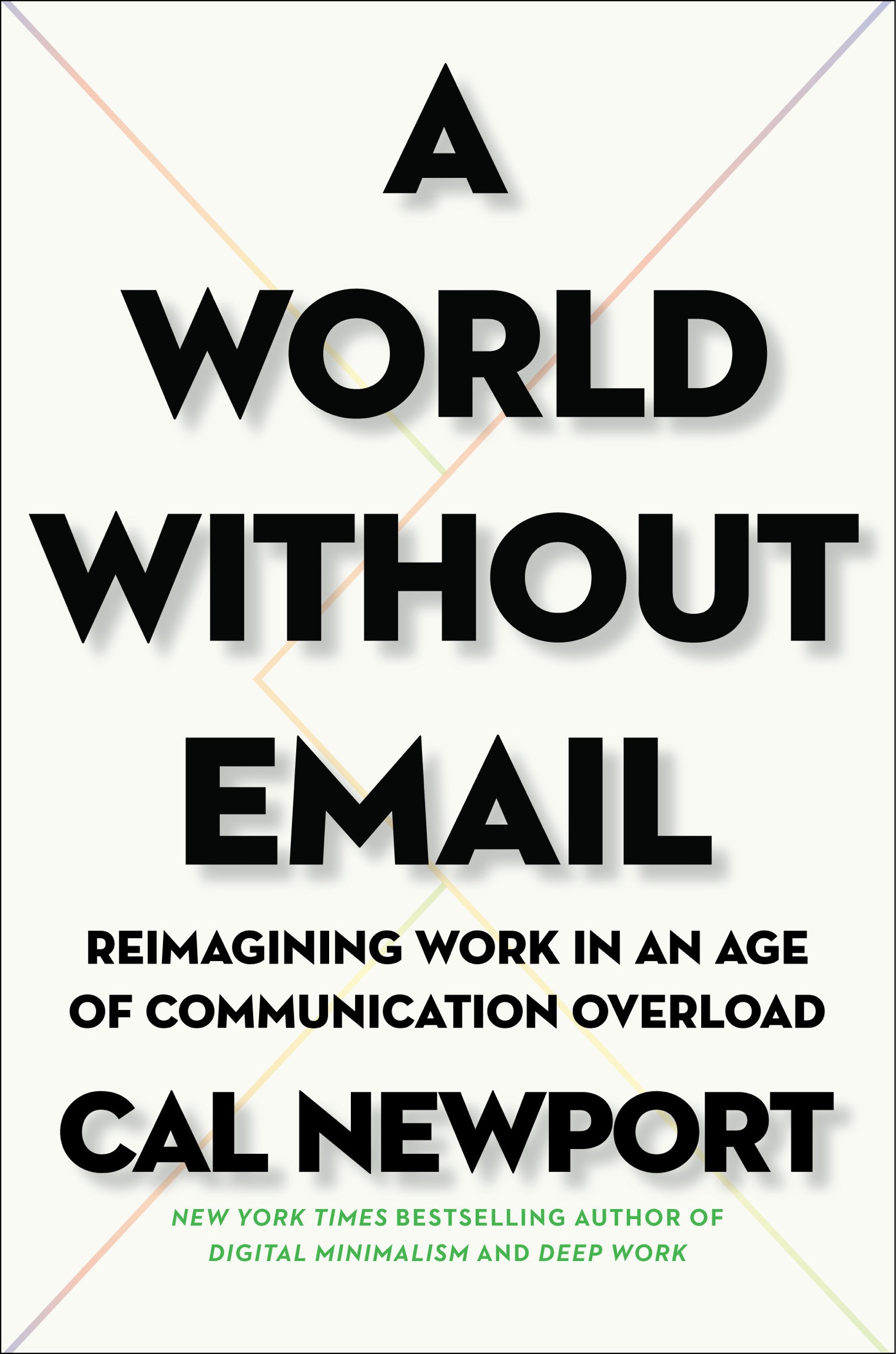
The Time-Block Planner
Digital Minimalism
Deep Work
So Good They Cant Ignore You
How to Be a High School Superstar
How to Become a Straight-A Student
How to Win at College
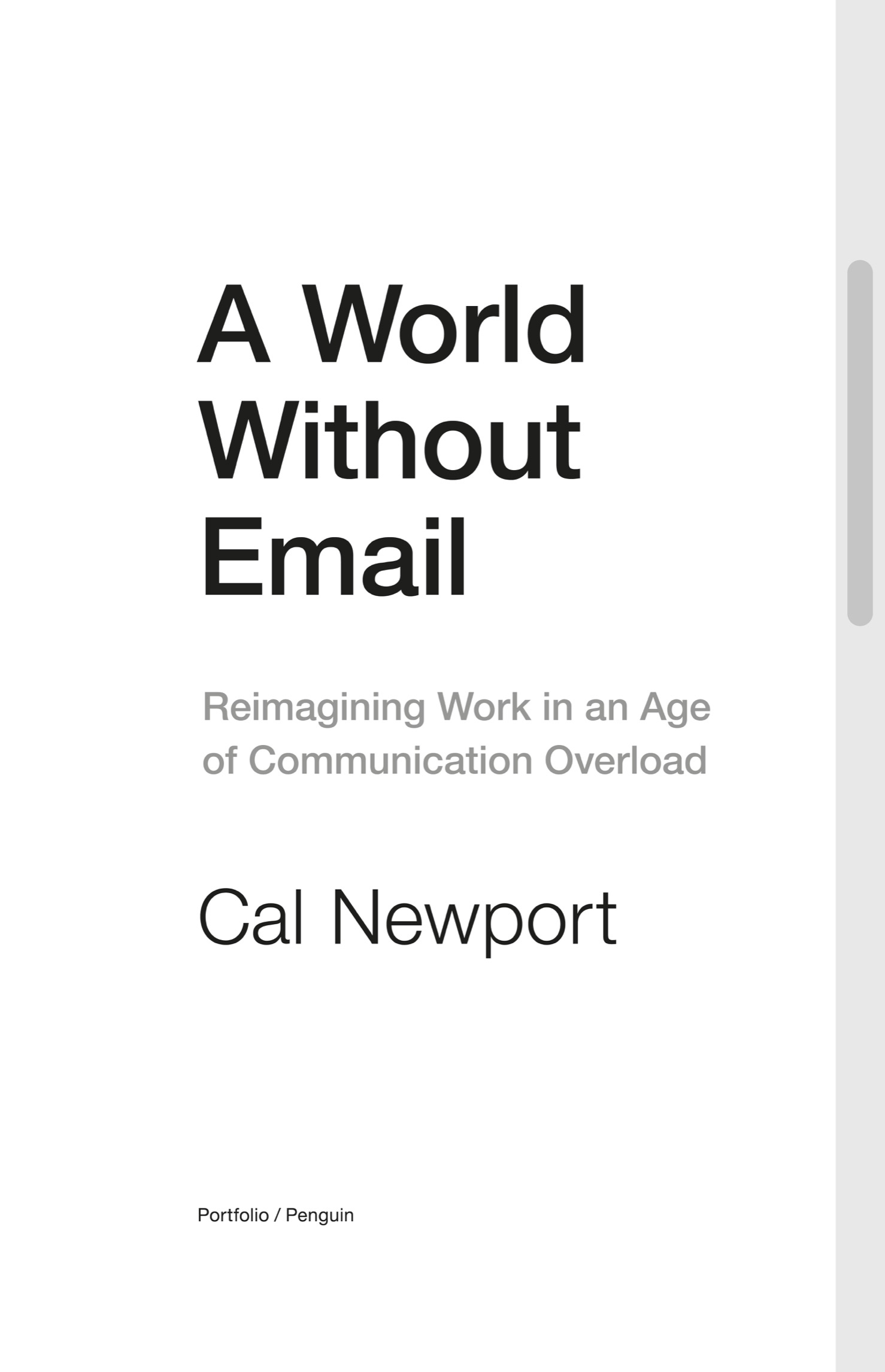

Portfolio / Penguin
An imprint of Penguin Random House LLC
penguinrandomhouse.com
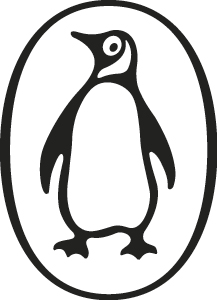
Copyright 2021 by Calvin C. Newport
Penguin supports copyright. Copyright fuels creativity, encourages diverse voices, promotes free speech, and creates a vibrant culture. Thank you for buying an authorized edition of this book and for complying with copyright laws by not reproducing, scanning, or distributing any part of it in any form without permission. You are supporting writers and allowing Penguin to continue to publish books for every reader.
ISBN 9780525536550 (hardcover)
ISBN 9780593332603 (international edition)
ISBN 9780525536574 (ebook)
Cover design: Jennifer Heuer
pid_prh_5.6.1_c0_r0
To Max, Asa, and Josh:
May your future not be dominated by inboxes
In late 2010, Nish Acharya arrived in Washington, DC, ready to work. President Barack Obama had appointed Acharya to be his director of innovation and entrepreneurship, and a senior adviser to the secretary of commerce. Acharya was asked to coordinate with twenty-six different federal agencies and over five hundred universities to dispense $100 million in funding, meaning that he was about to become the prototypical DC power player: smartphone always in hand, messages flying back and forth at all hours. But then the network broke.
On a Tuesday morning, just a couple of months into his new role, Acharya received an email from his CTO explaining that they had to temporarily shut down their offices network due to a computer virus. We all expected that this would be fixed in a couple of days, Acharya told me when I later interviewed him about the incident. But this prediction proved wildly optimistic. The following week, an undersecretary of commerce convened a meeting. She explained that they suspected the virus infecting their network had come from a foreign power, and that Homeland Security was recommending that the network stay down while they traced the attack. Just to be safe, they were also going to destroy all the computers, laptops, printersanything with a chipin the office.
One of the biggest impacts of this network shutdown was that the office lost the ability to send or receive emails. For security purposes, it was difficult for them to use personal email addresses to perform their government work, and bureaucratic hurdles kept them from setting up temporary accounts using other agencies networks. Acharya and his team were effectively cut off from the frenetic ping-pong of digital chatter that defines most high-level work within the federal government. The blackout lasted six weeks. With a touch of gallows humor, they took to calling the fateful day when it all began Dark Tuesday.
Not surprisingly, the sudden and unexpected loss of email made certain parts of Acharyas work quite hellish. Because the rest of the government continued to rely heavily on this tool, he often worried about missing important meetings or requests. There was an existing information pipeline, he explained, and I was out of the loop. Another hardship was logistics. Acharyas job required him to set up many meetings, and this task was substantially more annoying without the ability to coordinate over email.
Perhaps less expected, however, was that Acharyas work didnt grind to a halt during these six weeks. He instead began to notice that he was actually getting better at his job. Lacking the ability to simply send a quick email when he had a question, he took to leaving his office to meet with people in person. Because these appointments were a pain to arrange, he scheduled longer blocks of time, allowing him to really get to know the people he was meeting and understand the nuances of their issues. As Acharya explained, these extended sessions proved very valuable for a new political appointee trying to learn the subtle dynamics of the federal government.
The lack of an inbox to check between these meetings opened up cognitive downtimewhat Acharya took to calling whitespaceto dive more deeply into the research literature and legislation relevant to the topics handled by his office. This slower and more thoughtful approach to thinking yielded a pair of breakthrough ideas that ended up setting the agenda for Acharyas agency for the entire year that followed. In the Washington political environment, no one gives themselves that space, he told me. Its all neurotic looking at your phone, checking emailit hurts ingenuity.
As I talked to Acharya about Dark Tuesday and its aftermath, it occurred to me that many of the hardships that made the blackout hellish seemed solvable. Acharya admitted, for example, that his concern about being out of the loop was largely alleviated by the simple habit of calling the White House each day to learn if there were any meetings he needed to know about. Presumably, a dedicated assistant or junior team member could handle this call. The other issue was the annoyance of scheduling meetings, but this could also be handled by an assistant or some sort of automated scheduling system. It seemed, in other words, that it might be possible to preserve the profound benefits of the email blackout while avoiding many of the accompanying annoyances. What would you think of this way of working? I asked after explaining my proposed fixes. The phone line went silent for a moment. I had pitched an idea so preposterouspermanently working without emailthat Acharyas mind had temporarily frozen.
Acharyas reaction was not surprising. A widely accepted premise of modern knowledge work is that email saved us: transforming stodgy, old-fashioned offices, filled with secretaries scribbling phone messages and paper memos delivered from mail carts, into something sleeker and more efficient. According to this premise, if you feel overwhelmed by tools like email or instant messenger, its because your personal habits are sloppy: you need to batch your inbox checks, and turn off your notifications, and write clearer subject lines! If inbox overload gets really bad, then maybe your organization as a whole needs to tweak their norms around issues like response time expectations. The underlying value of the constant electronic communication that defines modern work, however, is never questioned, as this would be hopelessly reactionary and nostalgic, like pining for the lost days of horse transport or the romance of candlelight.
From this perspective, Acharyas Dark Tuesday experience was a disaster. But what if we have this exactly backward? What if email didnt save knowledge work but instead accidentally traded minor conveniences for a major drag on real productivity (not frantic busyness, but actual results), leading to slower economic growth over the past two decades? What if our problems with these tools dont come from easily fixable bad habits and loose norms, but instead from the way they dramatically and unexpectedly changed the very nature of how we work? What if Dark Tuesday, in other words, was not a disaster, but instead a preview of how the most innovative executives and entrepreneurs will be organizing their work in the very near future?
Font size:
Interval:
Bookmark:
Similar books «A World Without Email: Reimagining Work in an Age of Communication Overload»
Look at similar books to A World Without Email: Reimagining Work in an Age of Communication Overload. We have selected literature similar in name and meaning in the hope of providing readers with more options to find new, interesting, not yet read works.
Discussion, reviews of the book A World Without Email: Reimagining Work in an Age of Communication Overload and just readers' own opinions. Leave your comments, write what you think about the work, its meaning or the main characters. Specify what exactly you liked and what you didn't like, and why you think so.

